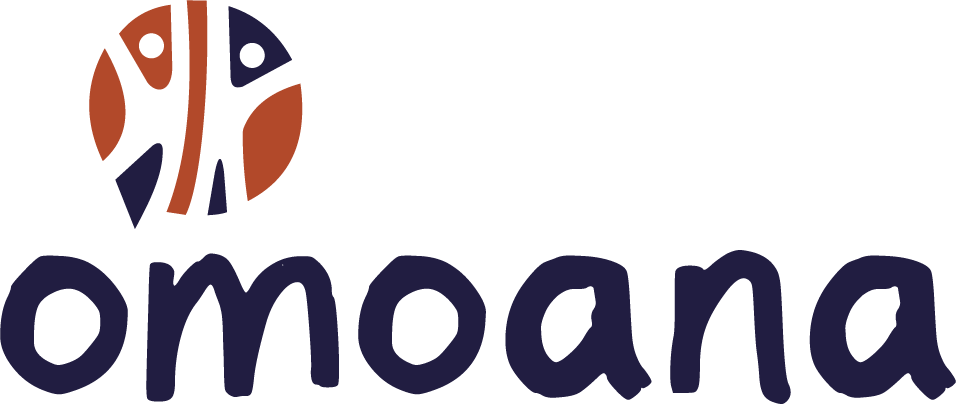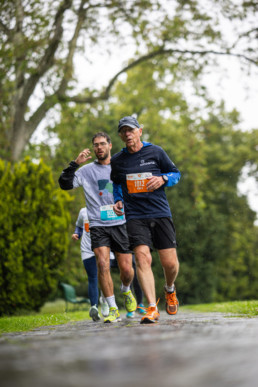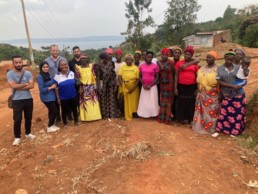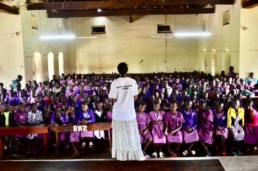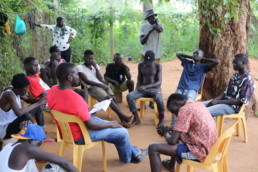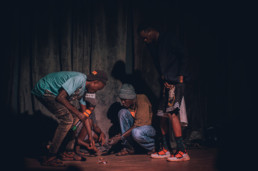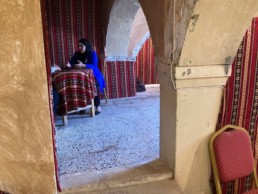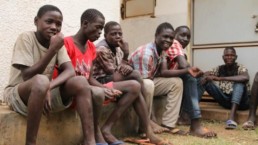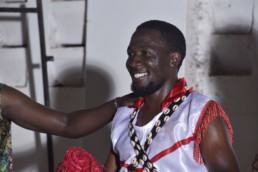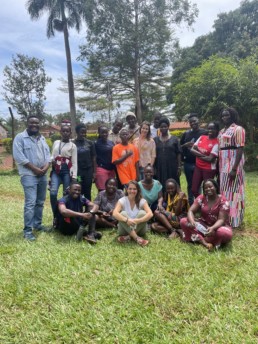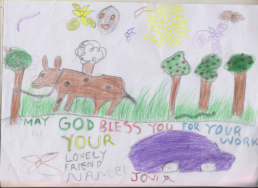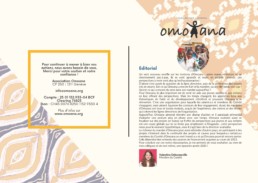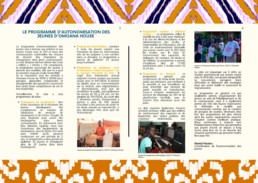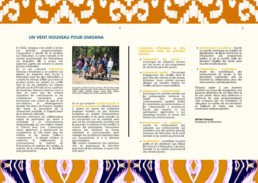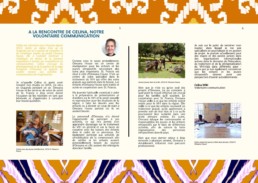Thank you for your support - News from Omoana - October 2024
Dear friends and donors,
Thanks to your unfailing support, we have been able to carry out some wonderful initiatives in recent months. In May, we organised a magnificent photo exhibition in Brussels in support of Omoana. A huge thank you to the talented photographer Maxime Collier for his moving work, and to everyone who came along and shared this moment with us. Your presence made this event a real success!
We also took part in the Race for Gift, where we were able to mobilise 20 passionate runners, collect 200 donations and raise an impressive total of CHF 13,659 to support our projects. A big thank you to all the participants and donors who, through their efforts and generosity, enable us to continue to make a real difference.
Finally, as we embark on a new donation tracking system, we would like to express our deep gratitude to Jean Genoud, father of our founder and director, for over 20 years of invaluable commitment, particularly in managing the database. His constant support has been an invaluable force for Omoana.
Your commitment to us is the driving force behind what we do, and for that we thank you a thousand times over.
2 weeks of exchange, 10 years of experience - News from Omoana - October 2024
Thanks to the Fédération Genevoise de Coopération’s Knowledge Sharing fund, three Iraqi colleagues were able to travel to Uganda, where they took part in workshops and visited projects. The exchanges, particularly on how to support children affected by violence, proved invaluable. Amjed Al-Rufaye gives us some feedback.
I’ve always been fascinated by the projects supported by Omoana in Uganda, but during my time there they continued to exceed my expectations.
My name is Amjed Al-Rufaye and I am originally from Baghdad, Iraq. In the past, I have worked for various NGOs in Iraq and Turkey. I am currently working as a technical advisor for Omoana and Aid Gate Organization in Iraq.
Our trip to Uganda began in Gulu with a four-day workshop bringing together teams from the NGOs currently supported by Omoana in Uganda. Along with other colleagues, we led visual art exercises for psychosocial support as part of the creation of the ‘Drawing Together’ manual. The workshop continued with Adrien and other drama coaches presenting drama exercises (for the ‘Theatre Together’ manual). It was a creative and interactive experience that filled the room with laughter. At the end, we listened to the feedback, discussed the importance of art, how it can benefit children and how it can be adapted to local projects and culture.
In the days that followed, we had meetings with Omoana’s NGO partners. We had a presentation of the teams behind the projects, exchanged questions and learned about each other’s experiences. After that, they took us out into the field and showed us how they interact with the local communities.
During these visits, I gained valuable information about the history and needs of the local community, and how Uganda and Iraq have gone through similar circumstances. For example, I loved what vivo is doing in Gulu to help victims overcome the trauma of being abducted by the Lord’s Resistance Army as children and the horrors they were forced to see or do. Hearing these experiences reminded me of the time of the Islamic State in Mosul and the stories I heard from the locals. It made me think about how we can adapt what vivo does to help young people in detention centres and the community. The same goes for St. Moses and Hashtag Gulu and the psychosocial support projects they run in the community, and how we can implement similar projects by supporting and revitalising community centres for neglected young people in Iraq. Omoana House and St. Francis and their support for people living with HIV have opened my eyes to a serious problem facing Iraq. The lack of awareness about HIV and the growing number of undisclosed cases in the community make it a potential time bomb.
We learned a lot about the processes of various development NGOs, the challenges they faced and how they overcame them. It provided me with information about Omoana, highlighted the importance of art and how it helped beneficiaries to express themselves when words were not enough. It also opened my eyes to new ideas and projects that can be adapted in Iraq. It was a very artistic experience filled with traditional dances and theatrical performances. In a fortnight in Uganda, we feel like we’ve gained ten years’ experience! We exchanged invaluable knowledge, immersed ourselves in a new culture and formed solid friendships, all the while escaping the 50°C temperatures in Baghdad.
Amjed Al-Rufaye
Technical Counsellor, Omoana
Young people marching towards a future together - News from Omoana - October 2024
Coming back from Uganda is always a mixture of joy and emotion for me. During my trip last September, I had the opportunity to attend an awareness-raising session run by Girls Menarche Initiative (GMI), our new partner, in an isolated village where access to education and resources is terribly limited. There, surrounded by shy but curious young girls, I was struck by the strength of this initiative and the hope it represents for thousands of girls who would otherwise be left behind.
In this remote village, seeing these young girls open up about a subject as sensitive as menstruation was a powerful moment. But what touched me even more was seeing the boys present, involved in the discussion. GMI understands that to break taboos and fight stigma, you have to talk to boys too. Their approach is incredibly intelligent: by educating both sexes, they transform the perception of menstruation into a collective issue of respect and empathy. In this way, boys become allies in the fight for equality and inclusion.
What touches me even more is the personal story that links us to GMI. One of the founders is a former beneficiary of Omoana House, our rehabilitation project for children born with HIV. To see that he has now become a key agent of change in his own community, working to transform the lives of other young people, was a moment that moved me deeply. It’s a great example of how, with support and resources, marginalised children can become the leaders and innovators of tomorrow.
By launching this project, ‘Menstruation doesn’t stand in the way of dreams’, we’re taking a new step together, and I know we’ll have a real impact. Because what we’re doing is much more than providing products or information. It’s about restoring confidence, dignity and hope. This project reminds me that every support counts, that every gesture we make resonates in the lives of these young people. Through this collaboration, we’re not just changing the face of menstrual insecurity, we’re building bridges between the past and the future, between the dreams of yesterday and the hopes of tomorrow. Thank you, from the bottom of our hearts, for your commitment to us.
Chloé Collier
Program coordinator
‘Family Together’, Supporting the families of children in conflict with the law - News from Omoana - May 2024
In Uganda and Iraq, children in conflict with the law have generally been exposed to situations of extreme violence. Various forms of exploitation, including prostitution, dangerous work, the sale of drugs and affiliation with armed groups, have affected their development. Many of those monitored by the Omoana partners have also been placed in detention in difficult conditions, far from their families. When they return, it is not always easy for their families to know how to support them emotionally.
This is why Omoana and its partners have created the ‘Family Together’ approach. These interactive sessions help families and friends to know how best to welcome children back from detention.
They are invited to reflect on the causes and contextual factors that lead children into these exploitative situations. They are also encouraged to draw inspiration from key people who have had a positive impact in their own lives to better support children and young people in their families. Sessions on child and adolescent development and the impact of trauma on children and adolescents are taught. Stress management methods for parents are also proposed. This is complemented by interactive exercises on communication and discipline, with role-plays inspired by forum theatre. Through these, they explore a way of guiding children by letting them know what behaviour is acceptable and what is not, in a way that is both firm and caring. Finally, they discuss how to boost their self-confidence. Alongside these group sessions, family members also have access to individual counselling.
Children in conflict with the law are first and foremost victims of exploitative systems, and require all the attention they can get. The method used by Omoana’s partners aims to put families at the centre of solutions. Omoana focuses on technical support and moves away from material support. Strengthening their ability to face adversity together is essential. This requires dedicated and competent social workers, whom we are lucky enough to have as partners, and to whom we try to offer the most relevant tools possible.
Tackling violence against children through forum theatre - News from Omoana - May 2024
Dealing with violence is not always easy. Presentations, discussions and documentation can certainly play a part in preventing it. However, when working with children and young people suffering from exclusion, it is necessary to find interactive methods that speak to them and appeal to their senses and emotions. Omoana uses forum theatre in its projects. Derived from Brazilian playwright Augusto Boal’s Theatre of the Oppressed, this approach invites the people concerned to address situations of violence and explore solutions through play, in a participatory way. A scene recounting a situation that ends badly is presented to an audience. The members are then invited to replace one of the characters in the scene, which is replayed with the other actors improvising as realistically as possible what should happen next.
In Gulu, Uganda, children who live or work on the street present their own forum theatre scenes to the community to discuss ways of preventing violence against them. In Iraq, in the Mosul juvenile prison, children use forum theatre to discuss situations relating to their return to civilian life, and the possible discrimination they could face. This enables them to prepare for their reintegration by experiencing situations and exploring them through play. By using their senses, their ability to react appropriately will help to avoid a new cycle of violence. Other themes such as gender equality are also addressed, enabling the young people themselves to seek solutions that are often more progressive and innovative than what might be imagined in contexts where patriarchal norms prevail.
Social workers from Omoana’s partner organisations are trained in the approach and are monitored. Several workshops have already been held and the feedback has been positive. In fact, they go beyond just talking about human rights, enabling everyone to take part in a very practical discussion about living together, in order to preserve the dignity of children affected by violence.
Technical know-how to help children affected by violence - News from Omoana - May 2024
If people’s ability to take care of themselves and others is strengthened, their resilience, both individually and collectively, will be optimised. This is how Omoana approaches helping the most vulnerable children. By involving family and community members in the development of solutions, children will be helped in a sustainable way. This is particularly true when their protection is threatened. If we take the example of children in conflict with the law, one of the association’s beneficiary groups, they have often been victims of the most abject forms of exploitation, such as forced prostitution or enslavement to armed groups. This has disastrous consequences for their well-being and future prospects. All resources must be mobilised in response. In this context, Omoana provides technical added value to its partners dealing with complex situations. In 2023, the ‘Youth Together’ manual, which offers psychosocial and violence prevention sessions to vulnerable young people, was produced.
This year, Omoana also developed the ‘Family Together’ approach. This aims to support parents of children in conflict with the law, giving them the tools to respond to the situations created by trauma, deprivation of liberty and the resulting consequences for their rights. In addition, to ensure that the emphasis is always on interactivity and on solutions coming from the people concerned, forum theatre is a widespread tool in all Omoana projects in Uganda and Iraq. It is the subject of an article in this new issue of Omoana News. It is this technical added value, this constant energy devoted to finding concrete solutions to difficult problems, this emphasis on mutual learning between those involved in the field, that makes Omoana a particularly important organisation in the contexts in which we work. We would like to thank you for believing in us and for your moral and financial support, which enables us to move forward.
Adrien Genoud,
Director
Supporting street children with Hashtag Gulu - News from Omoana - January 2024
We first met Mike and Irene, the director and accountant of Hashtag Gulu, in 2022 following a referral from our accounts and administration officer who lived in Gulu. They explained to us how their organisation came about and what they do. A year later, after taking the time to check the conditions of the partnership and reflecting together on our mutual contributions, here we are, working together on a brand new project: art as a tool for social integration for children in conflict with the law.
In Uganda, thousands of children and young people live and work on the streets and are affected by poverty, hunger and violence. They are rejected, feared and stigmatised by the local community, harassed and arrested by the police, with the risk of becoming criminals for lack of other viable options. Moreover, most street children and young people are already accused of a variety of social ills, and many end up in juvenile detention at least once during their childhood.
The project set up by Hashtag Gulu therefore aims to improve their social integration by using artistic activities to help them develop a positive attitude towards responsible living during, and after, imprisonment, while identifying and developing their talents. In addition, forum theatre is used as a platform for exchange with their community.
The project focuses on young people living on the streets and minors in detention, their parents and members of their communities. In this way, as the young people prepare to live harmoniously in their communities, their parents/guardians and the wider community also prepare to accept them. This is done by strengthening the capacity of these young people to defend their own rights. To this end, the following activities are being implemented: training in forum theatre, scene creation and presentation to communities; artistic training in music, dance and painting; awareness-raising events for parents and communities; parent-youth exchange meetings; and workshops for parents to reinforce a positive parenting approach.
Testimony of an artist from the show Resilience - News from Omoana - January 2024
I’m a 27-year-old HIV-positive person, a highly motivated leader and an active defender of sexual and reproductive rights (SRR), particularly for people living with HIV. I am a former beneficiary of the “Omoana House” project. Now, at St. Francis Health Care Services (hereafter: St. Francis), an Omoana partner, I hold the position of Youth Coordinator. This position allows me to strategically influence the DSR/HIV programmes for young people in the country. I am also director of the Jinja Network of young people living with HIV/AIDs (JNYPA), a network that promotes meaningful participation of young people living with HIV/AIDs and a stigma-free environment in the Busoga sub-region. Finally, I founded Batabaazi Culture Troop, a community-based cultural information and advocacy organisation on HIV/AIDS, tuberculosis and malaria, using Afro-centric and artistic approaches (music, dance and drama).
I lost all the important people in my life: my father when I was two weeks old, my mother when I was 14, then my grandmother and my uncle in a short space of time. I nearly dropped out of school, I stopped taking my antiretrovirals (treatment for HIV). My life went downhill, with no hope and no one to talk to for advice. I was depressed, but thanks to Omoana House, which is part of the St. Francis partner health care services, I was cared for, rehabilitated and brought back to school. I was able to get a diploma in accountancy and I can’t wait to go further. Today, I’ve created my own family. I have two beautiful children, a daughter and a son.
As a result, the Resilience show – which was due to be performed in Switzerland in November 2023, but had to be cancelled due to visa refusal – was a great way to showcase the kind of resilience I’ve shown along the way. I was, however, happy to be able to share this show in schools in Uganda, to bear witness to my journey and inspire other young people. I would like to thank St. Francis and Omoana for their continued support of young people living with and affected by HIV.
Nyanzi Huzairu,
Resilience performer and former Omoana House beneficiary
The start of a new decade - News from Omoana - January 2024
After celebrating its 20th anniversary, 2024 marks the start of a new decade for Omoana. As at the beginning of each year, it’s time to take stock of the past year, but also to look forward to the year to come.
On a personal note, I joined the organisation nearly 2 years ago and what made me want to apply has only been confirmed: Omoana is based on strong values and puts people at the centre of its projects. This last year has enabled us to consolidate our team. With the Director and the Accounting and Administration Manager, we now form a functional and efficient trio, supported by a Committee that has confidence in us. We’re learning from each other, and the spirit of goodwill is alive and well. I can say without shame that I am happy and proud to be in my position as coordinator, in a job that is meaningful and makes sense.
In terms of projects, I’ve already been lucky enough to go to Uganda 3 times, to meet our various partners and beneficiaries. As a result, strong relationships have been forged, guaranteeing fluid communication, real identification of needs and constant co-creation of solutions. Each time we travel, it’s so rewarding to discover the teams’ new ideas, the energy they put into their activities and their unwavering determination to have a positive impact!
As Omoana matures, it stabilises but also grows. Refocusing on specific areas of activity, expanding into Iraq, supporting new projects for children affected by violence – these were the aims for 2022. In 2023, this has been achieved, thanks in particular to the renewed confidence of our backers and donors. The work is intensifying and, as with every new project, this comes with risks that we have identified and measured.
In 2024, we’ll be focusing on increased fundraising and closer relations with our donors. There’s no shortage of ideas, and we’re already planning a number of events, the details of which we’ll reveal in due course.
So what can we wish for Omoana in this new year, and even decade? Probably a successful expansion, continued bonds of trust between all those involved and activities that continue to serve our mission. For our part, in any case, it’s with enthusiasm and motivation intact that we embark on 2024. I wish us, and all of you, the best of years!
Chloé Collier
Program coordinator
